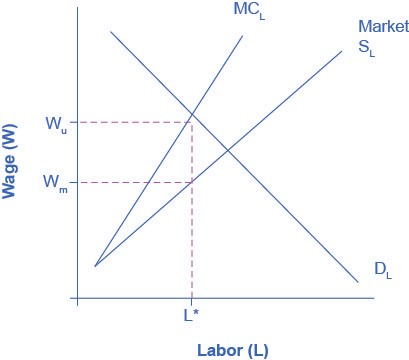Labor Market - Bilateral Monopoly
What is a Bilateral Monopoly in a Labor Market?
- Marketing, Advertising, Sales & PR
- Accounting, Taxation, and Reporting
- Professionalism & Career Development
-
Law, Transactions, & Risk Management
Government, Legal System, Administrative Law, & Constitutional Law Legal Disputes - Civil & Criminal Law Agency Law HR, Employment, Labor, & Discrimination Business Entities, Corporate Governance & Ownership Business Transactions, Antitrust, & Securities Law Real Estate, Personal, & Intellectual Property Commercial Law: Contract, Payments, Security Interests, & Bankruptcy Consumer Protection Insurance & Risk Management Immigration Law Environmental Protection Law Inheritance, Estates, and Trusts
- Business Management & Operations
- Economics, Finance, & Analytics
What is a Bilateral Monopoly in a Labor Market?
What happens when there is market power on both sides of the labor market, in other words, when a union meets a monopsony? Economists call such a situation a bilateral monopoly.

Employment, L*, will be lower in a bilateral monopoly than in a competitive labor market, but the equilibrium wage is indeterminate, somewhere in the range between Wu, what the union would choose, and Wm, what the monopsony would choose.
A monopsony wants to reduce wages as well as employment, Wm and L* in the figure. A union wants to increase wages, but at the cost of lower employment, Wu and L* in the figure. Since both sides want to reduce employment, we can be sure that the outcome will be lower employment compared to a competitive labor market. What happens to the wage, though, is based on the monopsonist’s relative bargaining power compared to the union. The actual outcome is indeterminate in the graph, but it will be closer to Wu if the union has more power and closer to Wm if the monopsonist has more power.
Related Topics
- Labor Economics
-
Labor Market Equilibrium
- Labor Market
- Labor Market Equilibrium
- Labor Market Efficiency
- Price, Supply, and Demand in the Labor Market
- Equilibrium Wage
- Shifts in the Demand for Labor
- What Causes Shifts in the Supply Labor?
- How Technology affects Demand for Labor?
- Minimum Wage as a Price Floor in the Labor Market
- What is the First Rule of Labor Markets?
- Labor Demand in Perfectly Competitive Markets
- Imperfect Competition in Labor Markets
- Monopsony
- Oligopsony
- Labor Market Power of Employers
- What is the marginal Cost of Labor?
- Labor Market Power of Employees
- What is a Bilateral Monopoly in a Labor Market?
- Wage Elasticity of Labor Supply
- Equilibrium in Supply and Demand in Labor Markets
- Shifts in Supply and Demand in Labor Markets